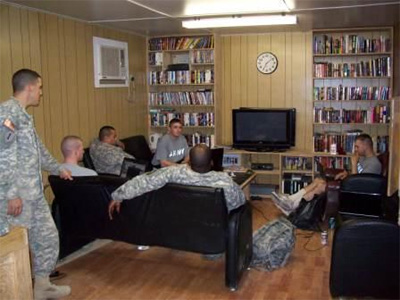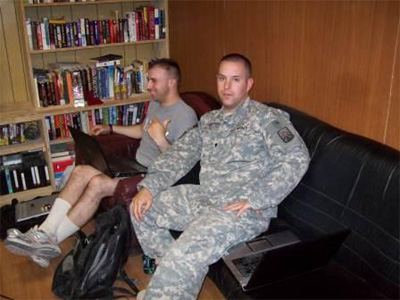
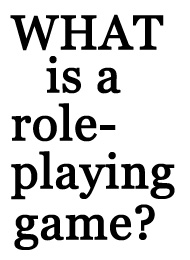 You
may occasionally hear the term "role-playing game" mentioned now and
then, and may even hear mention of certain games, like Dungeons & Dragons
or Vampire: The
Masquerade. The term RPG (short for role-playing game) is
often used to describe certain types of videogames, but just to make
things clear, this page is about the "pen and paper" or "tabletop" RPGs
that many people play while sitting together and speaking to each other.
You
may occasionally hear the term "role-playing game" mentioned now and
then, and may even hear mention of certain games, like Dungeons & Dragons
or Vampire: The
Masquerade. The term RPG (short for role-playing game) is
often used to describe certain types of videogames, but just to make
things clear, this page is about the "pen and paper" or "tabletop" RPGs
that many people play while sitting together and speaking to each other.
RPGs are a form of interactive storytelling, in which all of the participants act out the roles of characters in the story. In all, it's very similar to the childhood game of "let's pretend" or "cops and robbers," but with rules and a referee. Unlike other games, RPGs do not typically have clearly defined winners and losers - individual characters may have goals that they are trying to achieve, but overall, the goal of the game is to create a satisfying story.
One of the best ways I have heard to describe role-playing to a non-roleplayer is this one: Think of some of your favorite boardgames that you like to play, now or when you were younger; popular games like Monopoly, Battleship, Clue, Stratego, or Risk. Try to imagine playing one of those games while stepping into the role of a shrewd businessperson, a Navy captain, a master detective, or Army General. Now, instead of just rolling dice, drawing cards, and moving pieces around the board, you're acting out that role, interacting with the other players who are doing the same thing, and creating a story as well as playing a game.
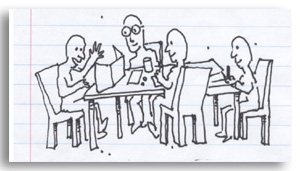 Now
take that idea a step further - instead of competing with the other
players, you are working with them as a team, to accomplish a specific
goal. One of the players that is acting as "gamemaster" is presenting
situations to you,
describing where your characters are and what they can see (and even
hear, feel, smell, and taste), and playing the roles of anyother
characters (friendly or otherwise) that your characters interact with.
This player prepares the story beforehand (by writing it and stocking
it with characters, or reading a prepared story), describes the scenes
and events of the story as they unfold, and tells the other players the
results of their actions.
Now
take that idea a step further - instead of competing with the other
players, you are working with them as a team, to accomplish a specific
goal. One of the players that is acting as "gamemaster" is presenting
situations to you,
describing where your characters are and what they can see (and even
hear, feel, smell, and taste), and playing the roles of anyother
characters (friendly or otherwise) that your characters interact with.
This player prepares the story beforehand (by writing it and stocking
it with characters, or reading a prepared story), describes the scenes
and events of the story as they unfold, and tells the other players the
results of their actions.
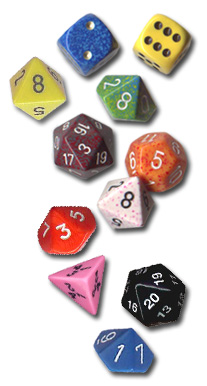 A
player's character is usually defined by a set of numbers or words that
describe different qualities about the character. For example -
a Dungeons
& Dragons character with a Strength score of 18 is
very strong (stronger than any
character with a lower score), and a Vampire
character with two dots in the Acrobatics skill is pretty good at
jumping and tumbling. As you can see from this basic example, the rule
systems between different role-playing games can work in very different
ways.
A
player's character is usually defined by a set of numbers or words that
describe different qualities about the character. For example -
a Dungeons
& Dragons character with a Strength score of 18 is
very strong (stronger than any
character with a lower score), and a Vampire
character with two dots in the Acrobatics skill is pretty good at
jumping and tumbling. As you can see from this basic example, the rule
systems between different role-playing games can work in very different
ways.In most of these games, dice are used to generate random numbers to resolve certain events (such as whether a character can climb a slippery wall, or if an attempt to fast talk a guard will work). These dice come in an array of shapes and sizes; a common set of dice includes 4-, 6-, 8-, 10-, 12-, and 20-sided dice. Some games use a complete set of these dice (Dungeons & Dragons and Call of Cthulhu are two examples), while others may only use one particular kind (GURPS uses only 6-siders, for example, while the World of Darkness games use only 10s). In others, dice are replaced with other randomizers such as cards, or in some cases, removed altogether in what is often called a "diceless" system.
Miniature plastic or metal figures are used in some games, such as Dungeons & Dragons, to help the players visualize where their characters are in a scene. They aren’t used in many RPGs, however, so you frequently will not see them at a game session. There are also strategy wargames that use the same or similar figures – these games are also a lot of fun, but are not quite the same thing as a role-playing game (even though RPGs were actually born from the wargaming hobby).
RPGs are usually played in a comfortable area with a table where everyone can relax while they play and have somewhere to put their books, notes, and dice. There is a “sister” hobby to RPGs called Live Action Role Playing (or LARP for short) where players dress as their characters and occasionally use props and/or foam weapons during the game.
Here is an example of how the character's abilities and dice are used to determine the results of an action in a roleplaying game. In this example, a group of players is participating in an espionage RPG, and one of the players thinks she has discovered the warehouse where some hostages are being held. When she tells the gamemaster that her character wants to check out the back of the building, she finds an opportunity to put her character's skills to work:
Gamemaster: You sneak around to the back of the building. The alley is damp and dark, and you see stacks of pallets, a dumpster, and some old garbage cans. Next to the dumpster, you see a padlocked door. No one seems to be around.
Player: Sarah is going to try to pick the padlock. She has a Lockpicking skill of +5.
 Gamemaster:
The lock looks new, and well made. It's going to be pretty
challenging to pick. Roll a 16 or higher to get it open.
Gamemaster:
The lock looks new, and well made. It's going to be pretty
challenging to pick. Roll a 16 or higher to get it open.
(The player rolls a 20-sided die and adds 5 to the result, hoping to get a result of 16 or higher. If she does, her character will have successfully picked the lock - if not, she will have to find another way in...)
Depending on the results of that die roll, the gamemaster will describe what happens to Sarah, and the player may get to respond with further actions that she would like the character to take. Other players may step in to have their characters get involved as well, and the game (and story) continue in this way.
There are, of course, exceptions to all of this. Some RPGs, as mentioned above, do not use dice at all. Some may not have a gamemaster, or may use a system where the players help direct what happens in the story, taking some of the control away from the gamemaster. There are even some RPGs where the players are working against each other, and trying to make everything go their way. But the basic concept is still the same - a game where a group of players cooperate to create a satisfying story.
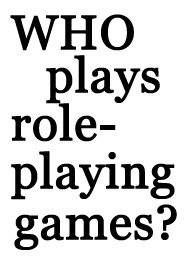 Lots of people enjoy
role-playing games. In fact, the odds are that you probably know
someone who does, or used to. Roleplayers come from all walks of life,
education levels, income levels, and social groups. Roleplaying games
are popular in many countries all over the world (and, as a result, are
published in many different languages).
Lots of people enjoy
role-playing games. In fact, the odds are that you probably know
someone who does, or used to. Roleplayers come from all walks of life,
education levels, income levels, and social groups. Roleplaying games
are popular in many countries all over the world (and, as a result, are
published in many different languages).
It's difficult to find accurate numbers on the amount of people who play RPGs, since research into the matter is usually expensive and time-consuming. In a study conducted in 2000 by Wizards of the Coast (the publishers of Dungeons & Dragons), it was estimated that approximately 5.5 million people from the United States between the ages of 12 and 35 play tabletop roleplaying games, and one fifth of that group (over 1 million) are female.
These numbers would be even higher with the inclusion of gamers on both sides of that age range - there are many roleplayers older than 35, and the recent popularity of RPGs for young children would add more to the under-12 side of the spectrum, as well. Additionally, times have changed quite a bit since the Wizards study was conducted - two new editions of Dungeons & Dragons, tons of other RPG releases, and the popularity of PDFs and ebooks have likely increased the number of roleplayers considerably.
RPGs are particularly popular among members of the military, who use it as a relaxing pasttime that doesn't require much in the way of space or equipment. Rumor has it that every ship in the US Navy has a roleplaying group on board. While that may not be completely true, it's probably a safe bet that most of them do. (You can read stories about military gaming groups here and here.)
Many celebrities have played RPGs in the past, and many still enjoy them today - Stephen Colbert, Anderson Cooper, Vin Diesel, James Franco, Artie Lange, Matthew Lillard, Mike Myers, Patton Oswalt, Wil Wheaton, Elijah Wood, and members of Barenaked Ladies, My Chemical Romance, Rage Against the Machine, Slipknot, System of a Down, and Weezer, to name very few.
RPGs are also popular with creative professionals, such as poet Sherman Alexie, actor/director Jon Favreau, writer/director James Merendino, animator Chris Prynoski, writer John Rogers, CEO Ed Castillo, production executives Mark Haimes and Ralph Sanchez, and director Paul Weitz, and there's at least one sports celebrity - basketball player Tim Duncan - who enjoys playing as well.
Many of these people have spoken out about the creative benefits of playing RPGs, too. Here are just a few examples:
| "Playing
D&D was a training ground for our
imaginations and an
opportunity to explore our own identities. I started acting when I was
seven, and this game was a constant exercise in developing voices and
characters," - Vin Diesel |
"My
interest in filmmaking was totally driven by
D&D." - James Merendino, writer and director of SLC Punk |
| "Dungeons
& Dragons is one of the few oral traditions remaining in the
modern
world." [It] has produced an entire generation of players who are out
there now, in all walks of life. They are particularly heavy on the
ground in the entertainment world, using all those same lessons I
picked up along the way." - John Rogers, producer and writer of over ten feature films |
"...in
this day and age, imagination is a
dwindling
resource, and social interaction on the decline. Playing Dungeons
&
Dragons can be a whetstone that sharpens both imagination and
creativity, a workshop on team interaction and heroism." - Ed Castillo,
president of Liquid Entertainment |
| "...while
playing D&D, I pretended
so often to have courage and strength that I learned how to display
courage and strength in my real life." - Sherman Alexie, poet and novelist |
"...it
seems clear to me
that D&D invented or, at the very least, legitimized a type of
creative play that helped build mental muscles in an entire generation
of future fantasy scribes, screenwriters, and filmmakers." - Marc
Haimes, production executive, Dreamworks S.K.G. |
| "(Dungeons
& Dragons gave me) a really strong background in imagination,
storytelling, understanding how to create tone and a sense of balance." - Jon Favreau, director |
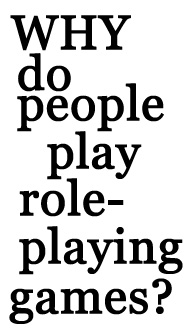 For the same reason that
people play any other types of games - for fun! There
are lots of different aspects of the roleplaying hobby that people find
appealing:
For the same reason that
people play any other types of games - for fun! There
are lots of different aspects of the roleplaying hobby that people find
appealing: - Some enjoy the act of portraying a memorable character, or participating in a memorable story.
- Some enjoy the opportunities for exploration, or recreating historical events.
- Some enjoy the world-building aspects, creating a new lands, new planets, and new dimensions for the players to explore.
- Some enjoy the mechanics of the game rules, and how they can work to create a simulated reality.
And some enjoy two or more of these aspects of the hobby.
Roleplayers enjoy a wide variety of game worlds to explore that are in no way limited to the heroic fantasy of Dungeons & Dragons - there are RPGs set in historical eras, science fiction, and games based around superheroes, horror, espionage, and even cartoons. RPGs can be any degree of silly or serious, detailed or abstract, simple or complex.
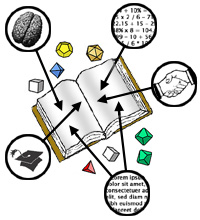 Players
and gamemasters can enjoy RPGs set in familiar worlds from movies,
television, and literature, such as Star Wars, Star Trek, The Lord of
the Rings, Ghostbusters, and Men in Black (to name a few). Or they can
explore amazingly detailed places (cities, worlds, and even universes) that have been created specifically
for roleplaying, like the Forgotten Realms, Glorantha, Alpha Complex, Hârn, Eberron, Freedom City, Talislanta, Theah, Star*Drive, Barsaive, Rokugan, Jorune, Poseidon, and the World of Darkness (to name a few).
Players
and gamemasters can enjoy RPGs set in familiar worlds from movies,
television, and literature, such as Star Wars, Star Trek, The Lord of
the Rings, Ghostbusters, and Men in Black (to name a few). Or they can
explore amazingly detailed places (cities, worlds, and even universes) that have been created specifically
for roleplaying, like the Forgotten Realms, Glorantha, Alpha Complex, Hârn, Eberron, Freedom City, Talislanta, Theah, Star*Drive, Barsaive, Rokugan, Jorune, Poseidon, and the World of Darkness (to name a few).
There are even RPGs that cross one or more genres. Shadowrun mixes near-future cyberpunk with fantasy creatures like elves and orks, while Deadlands combines the Wild West with horrific monsters and undead. Creative gamers aren't limited to off-the-shelf crossovers, and frequently create their own mixed genres to adventure in.
There are many intellectual benefits that come from playing roleplaying games: reading skills, basic math skills, teamwork, problem solving, creativity, and spatial reasoning. RPGs can inspire appreciation of art and literature, interest in history, economics, science, world cultures, and much more. While many gamers may not play RPGs specifically for these benefits, they are exposed to them regularly, regardless!
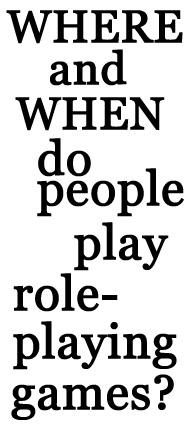 The stereotype tells us that most games of Dungeons & Dragons
happen in your parent's basement - but as we all know, stereotypes are
usually not accurate. People play RPGs in their dining rooms, living rooms and rec
rooms as well.
The stereotype tells us that most games of Dungeons & Dragons
happen in your parent's basement - but as we all know, stereotypes are
usually not accurate. People play RPGs in their dining rooms, living rooms and rec
rooms as well.
They may even play them at schools, libraries, and other public places - in fact, many schools have RPG clubs as afterschool activities, and many libraries feature roleplaying events as well. Gamers have been known to play them outdoors at the park on a nice day - and there is at least one RPG (called SHERPA) that is meant to be played while going on a hike!
 |
Stores that sell roleplaying games often have an area set aside for playing games, and may even have a special day or evening set aside for RPGs. You may occasionally find the same thing in comic book stores as well. There are many roleplaying clubs who meet regularly and play a variety of different RPGs, either in a public meeting area or in someone's home.
At game conventions around the world, one can find many gamers and gamemasters participating in several roleplaying events. While these conventions happen all year around, the majority of them occur during the summer months (when gamers are more likely to take some vacation time).
The two biggest game conventions in the United States are Gen Con (held in Indianapolis, Indiana in August with about 36,000 attendees) and Origins (held in Columbus, Ohio in May/June with about 14,000 attendees). Both of these conventions feature hundreds of roleplaying events of all types - from the simple to complex, dramatic to humorous, and everything in between.
But those are certainly not the only ones - there are game conventions all over the country, and all around the world. Many are hosted by local organizations, stores, or even colleges and universities, and are held year-round, giving many gamers the opportunity to meet and play with other gamers and try new and different roleplaying games.
You can find many resources for locating gamers, game stores, and game clubs in your area on the Finding Gamers page of the Escapist website.
If you would like to find a game convention in your area, try the following links:
- Containment
- Gamingcons.com
- List of (worldwide) gaming conventions (Wikipedia)
The Escapist is a website devoted to roleplaying advocacy - informing people about the roleplaying hobby, dispelling the myths and misconceptions, encouraging new people to try it, and spreading the word about the benefits it can provide. To find out more about RPGs, visit The Escapist at www.theescapist.com
